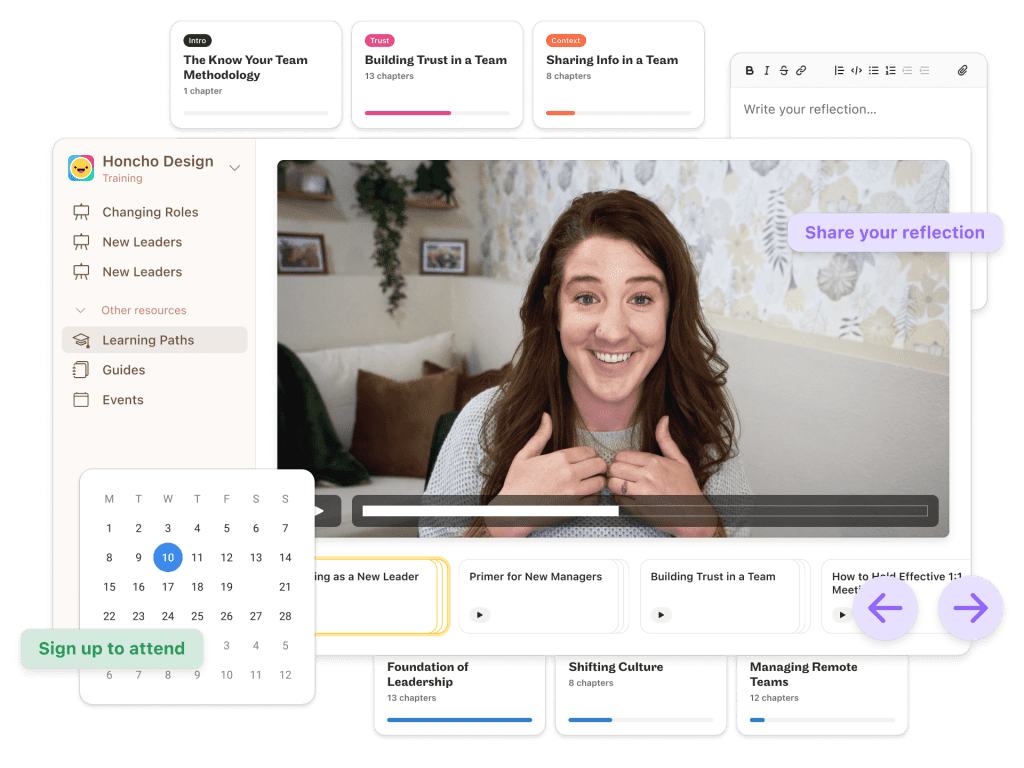If you’re internally promoting your managers and creating a career path framework for managers, keep these 5 considerations in mind.

“Do we have a career path framework for managers?” asks one of your newly promoted managers. You knowingly nod: While you don’t have a career path framework for managers yet, it’s something that’s currently on your to-do list or “in the works.” You’re likely the only person who makes up your People Team at the company at the moment (or one of just a few folks on the People Team) – and you’re strapped for time. This is one of many initiatives you have on your never-ending list…
Once you do get to it, woosh! What a time-intensive process creating a career path framework for managers can be. Research, matrixes, to-dos, surveys… It can feel like months before you’re able to roll something out.
As a result, to help save you time in your process, I wanted to zero-in on the 5 most important considerations when creating a career path framework for managers.
First things first: What is a career path framework?
At its core, a career path framework is an expectation-setting tool. It helps make clear to an employee – and to upper leadership – what the opportunities for growth and career advancement look like in an organization.
If you’re internally promoting your managers at your organization, a strong career path framework helps then set the expectation for growth and promotion. But also, it helps sets a standard for what “good” actually looks like as a manager, so they can perform at the highest level.
Why is it useful?
Practically, an organization can use a career path framework to:
- Set expectations for what positive growth looks like, so employees can feel a sense of forward progression in their careers and feel more focused in their work
- Help with retention, as a lack of growth opportunities is one of the primary reasons that top-performing employees leave especially in 2022
- Help frame growth conversations and give a reference for employees to know what core competencies and skills to improve
- Set expectations for how to achieve a promotion
- Set salary expectations
The 5 most important considerations when creating a career path framework for managers:
#1: Get clear on defining what “good” is.
Start googling “what makes a good leader,” and after thousands of search results, it can be hard to distill down as you create your career path framework.
As a result, we here at Know Your Team, have distilled the definition of “good leadership” for you.
Based on our research over the past 10 years, the 3 core competencies we’ve identified that are most critical for a leader to learn are: Trust, Context, and Honesty. Feel free to cite these three core competencies as the basis of your manager career path framework.
Specifically, you may want to visit these resources on how to define what it means to be a “good leader” for your career path framework for managers:
- Watch: How to create a leadership operating model. This essential 60-minute webinar shares the playbook on how to define in-depth “good leadership” for your managers, and how to create an operating model to help drive “good” and consistent behaviors for your managers.
- Read: The 10 qualities of a good leader. This article shares the 10 qualities that you can translate into competencies as you design your career path framework for managers.
- Read: 5 essential expectations of a good manager. This article shared the 5 critical expectations of “good managers” that you can infuse into your career path frameworks.
#2: Spend a disproportionate amount of time on helping folks decide if they even want to enter the very first “level.”
Does this person actually want to be become a manager in the first place? Do they know what the role really entails and is that truly the kind of growth they are seeking? It’s easy for folks to say “I want to be a manager!” before truly understand what the role requires on a day-to-day basis.
This may be likely the most overlooked aspect of creating a career path framework for managers. Read our article on “Do I truly want to become a manager?” to help you and the employee in question discern this.
#3: Recognize the difference between a frontline manager and manager of managers.
Going from managing a direct team to managing other managers is a big leap – and one not suited for everyone. When you manage other managers, you become even more removed from the work itself and must operate more as a coach’s coach, and focus on big picture vision.
Read our article on “Managing Managers” to help you outline what changes when you become a manager of other managers in your career path framework.
#4: Keep it simple + clear.
Anything that is convoluted and burdensome will discourage and frustrate your employees. Instead, focus on keeping things simple. For example, don’t list out 12 different competencies someone needs to have in a role, focus on say three to five.
For reference, are some of career path frameworks for managers that over companies have instituted:
#5: Support your managers to enact their career path
There are few worse feelings than having a high bar set for you… without any clear path to get there. As a result, when you create your career path framework for managers, you want to clearly answer for your managers: “How you can improve your skills as a manager?” Otherwise, you leave your managers hanging and feeling stifled in their growth.
To help your managers improve in each of these core competencies, use our Manager Training Platform – it’s the fastest, most effective way to upskill your managers towards each of those core competencies (e.g., giving feedback, setting direction, etc.). This way, you’re not just listing out core competencies in your career path framework, but supporting your leaders to achieve those core competencies.
Start here with these 5 considerations when creating a career path framework for your managers. Each of these considerations will help you accelerate your process so you get most quickly enable your managers to be performing at the highest level.
Take a tour of our Manager Training Platform today to upskill your leaders and enact your career path frameworks for managers ⚡️




